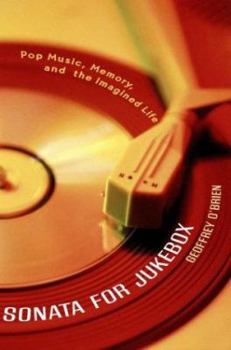Sonata for Jukebox: Pop Music, Memory, and the Imagined Life
Select Format
Select Condition 
Book Overview
From one of our most original essayists and critics, a wide-ranging, freewheeling, utterly brilliant foray into the last fifty years of pop music and the multitudinous ways to hear it. Dazzling and... This description may be from another edition of this product.
Format:Hardcover
Language:English
ISBN:1582431922
ISBN13:9781582431925
Release Date:January 2004
Publisher:Counterpoint LLC
Length:328 Pages
Weight:0.70 lbs.
Dimensions:1.1" x 6.6" x 9.4"
Customer Reviews
2 ratings
An utterly original thinker
Published by Thriftbooks.com User , 18 years ago
This book is pretty much impossible to describe well and truly, but anyone who truly loves music and has found themselves, through the course of life, frequently lost in the act of listening, or reminscing about the experience of hearing particular music, is urged to read this brilliant, imaginative, beautiful and moving work. O'Brien's book about the experience of movie-going, "The Phantom Empire," estabished him as one of the great, unique movie viewers, and this one does the same for his listening. And that is what this book is about, listening. This is not about music, and that is an important distinction! It's about the experience of listening, and how what we listen to is incorporated into our personal history. But it's also about much more than that: his chapter on American Folk Music is one of the most astonishingly brilliant pieces of critical thinking about music I have ever read, his section on ambient music is subtle, mysterious and extraordinary. Most of his listening, at least in this book, is of pop music, jazz, rock and other popular forms. But regardless of your listening habits, this book will be a pleasure and a beautiful companion to your own love of music.
O'Brien Pens Another Flawless Volume of Really Cool Stuff
Published by Thriftbooks.com User , 19 years ago
Sonata for Jukebox: Pop Music, Memory, and the Imagined Life is yet another stunning collection of cultural observations from poet/writer/critic/editor Geoffrey OÕBrien, "the thinking manÕs thinking man." While framed as a series of essays on the history of American pop music, Jukebox is to the average collection of non-fiction pieces as JoyceÕs Dubliners is to a run-of-the-mill short story grouping. OÕBrien is just firing on so many cylinders, operating on so many levels, that the book pretty much transcends classification: one is tempted to appropriate musical terms of art in order to do the thing justice. These essays use 20th Century pop tunes as touchstones for exquisite, haunting riffs on family, radio, loneliness, love, commercialism, companionship, loss, youth, ageÉ they give voice to ideas that loop and rise and fade, only to crackle forth again when we least expect them--like a snippet of BBC commentary on a shortwave, or some phrase of oboe melody in a Mozart piece--before evanescing once more.What I found most enjoyable about this collection, however, was the accessibility of OÕBrienÕs references. His commentary is profound and original, but this isnÕt the sort of grandstanding "insider" claptrap that so often typifies music writing. ThereÕs no wink-wink nudge-nudge stuff about how it was really the bass playerÕs second cousin filling in on the B-side during that infamous Hamburg session, because (as "we" all know) PumpkinheadÕs ex-girlfriend had bronchitis that week. The author instead accords highly appropriate gravitas to songs we actually know, e.g. "Surfer Girl" and "Walk on By." ThereÕs just something so pleasurable about reading the work of a guy who totally GETS the music weÕve been inundated with through the years. OÕBrien summarizes "IÕd Like to Teach the World to Sing" as "a Coca-Cola jingle transformed into the kind of song that a chorus of Chinese orphans might have sung in a late Ô50s movie about missionaries martyred by Communists." He articulates that the trouble with "Tie a Yellow Ribbon ÔRound the Old Oak Tree" is its "ineluctable stridency." Jukebox doesnÕt bypass the contributions of Alan Lomax or Tin Pan Alley or Jimmie Rodgers or Paul Robeson to musical history, itÕs just that OÕBrien doesnÕt have to beat the underbrush for nuggets of footnotable obscurity in order to be taken seriously. He finds meaning in the ubiquitous, and shares this wisdom with an open handÑaccomplishments which are entirely too rare. Perhaps the best way to summarize this book is with a description from within it: "He will walk you through the history of music as though it were the history of the world, and as if both were nothing more than the history of this particular evening, the story of how you will somehow reach dawn." A writer who can achieve that sonority and then observe, "I will know that old age has arrived when even the oldies are unfamiliar songs of younger generations," is a guy deserving both our respect and applause.




